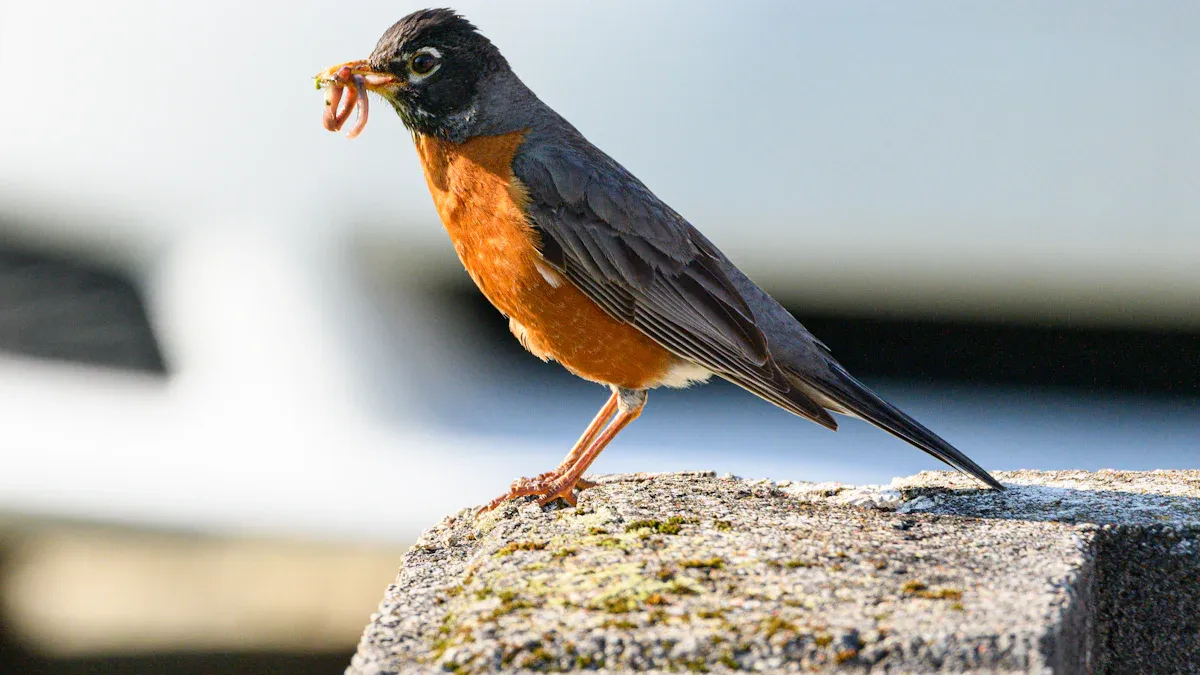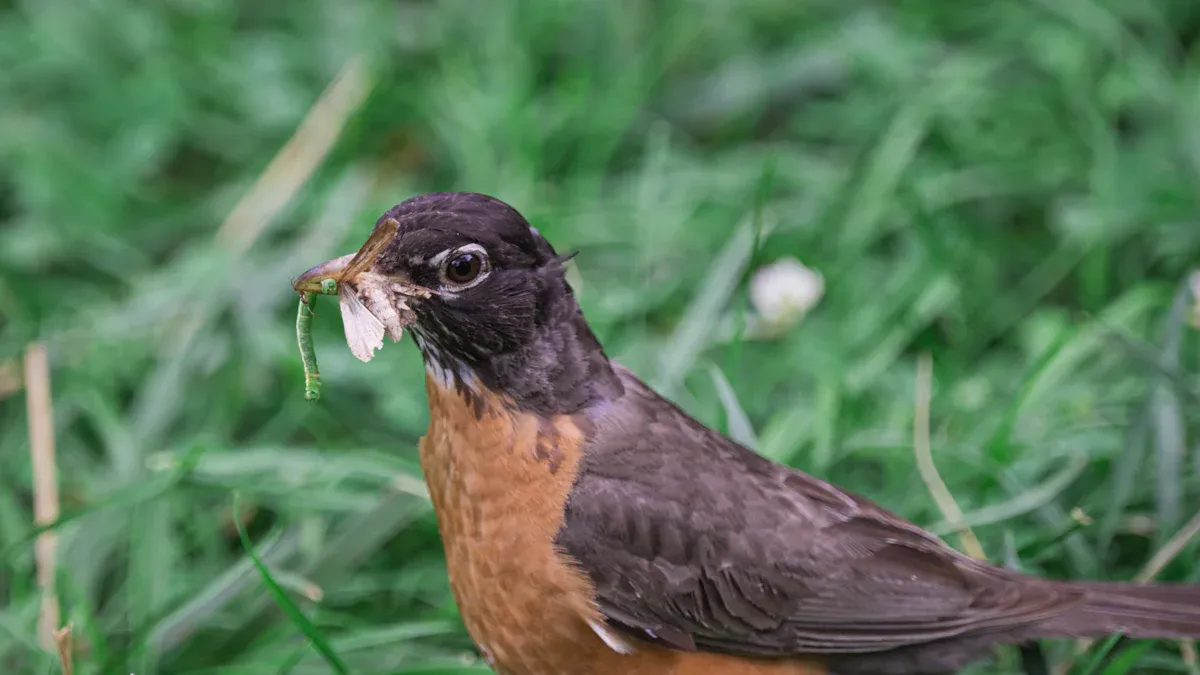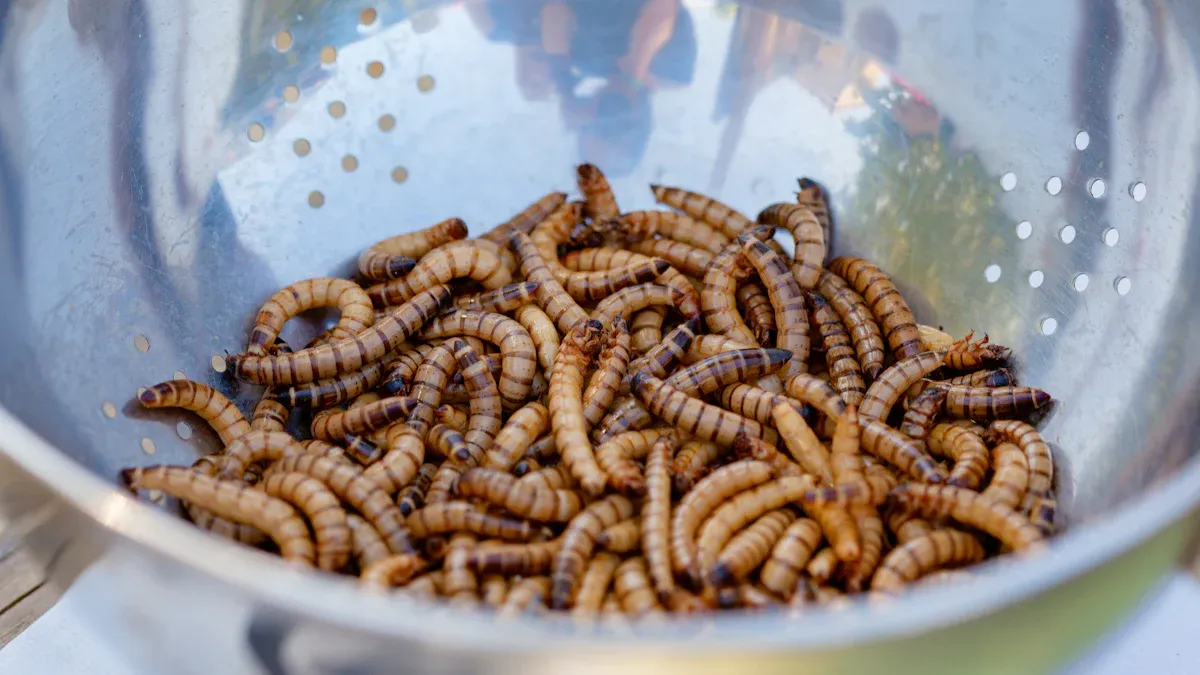
Many bird lovers want to see more feathered friends in their yards. Dried meal worms in bulk give birds a tasty snack packed with protein. They help birds stay healthy and active. Feeding birds this way saves time and makes backyard birdwatching even more fun.
Key Takeaways
- Dried mealworms in bulk provide birds with high protein and essential nutrients that support their growth, energy, and feather health.
- Buying mealworms in bulk saves time and money, offers a long shelf life, and requires simple storage without refrigeration.
- Feeding mealworms properly attracts many bird species, supports their breeding and molting needs, and helps create a lively backyard bird community.
Nutritional and Practical Benefits of Dried Meal Worms in Bulk

High Protein and Essential Nutrients for Birds
Birds need protein to grow strong and stay healthy. Dried meal worms in bulk give them a rich source of protein and other important nutrients. Studies show that yellow mealworms (Tenebrio molitor) help birds like Japanese quails grow better and have stronger bodies. These mealworms contain about 17-22% crude protein, which supports muscle growth and energy. They also provide calcium, lysine, and methionine. These nutrients help birds build strong bones and feathers.
Researchers found that broilers fed with mealworm larvae had heavier bodies. This shows the high quality of protein in mealworms. Lab tests confirm these results. Scientists use special methods to measure protein, fiber, and fat in mealworms. They dry, grind, and test the mealworms to make sure they are packed with nutrients. This makes dried meal worms in bulk a smart choice for anyone who wants to help birds thrive.
Tip: Dried mealworms are not just for wild birds. Many pet owners use them for reptiles, amphibians, and even pet birds. They are the larval form of the darkling beetle and offer a balanced mix of protein and fat when gut-loaded properly.
Convenience, Cost Savings, and Long Shelf Life
Buying dried meal worms in bulk saves time and money. Bird lovers do not need to shop often or worry about running out of food. Dried mealworms last a long time because they have little moisture. This means they do not spoil quickly and do not need a fridge. People can store them in a cool, dry place without much effort.
Conventional bird feed, like seeds, needs careful storage. Seeds can get moldy or attract bugs if not kept in airtight containers. Feeders must be cleaned often to stop bacteria from growing. Dried mealworms make things easier. They are low-maintenance and stay fresh for months.
| Feed Type | Storage Needs | Shelf Life | Maintenance |
|---|---|---|---|
| Dried Mealworms | Cool, dry place | Long (months) | Low |
| Bird Seed | Airtight container | Shorter | High (clean often) |
| Nectar | Refrigeration needed | Very short | Very high |
Reliable Food Source for a Variety of Bird Species
Dried meal worms in bulk attract many types of birds. Bluebirds, robins, wrens, and chickadees all enjoy them. Even some woodpeckers and finches will visit feeders with mealworms. Experts have used mealworms to feed birds for over 50 years. The Royal Society for the Protection of Birds recommends mealworms as a natural food for birds all year.
Mealworms are easy to find and use. Aviculturists and bird enthusiasts trust them because they are always available and simple to feed. While birds need a mix of foods for the best health, mealworms fit well into their natural diets. People can offer them alone or mix them with seeds and fruits for variety.
Note: For best results, some bird lovers condition mealworms with vegetables before feeding. This adds extra nutrition and keeps birds happy and healthy.
Dried meal worms in bulk make feeding birds simple, affordable, and effective. They help create a lively backyard full of healthy, active birds.
Supporting Bird Health and Safe Feeding Practices with Dried Meal Worms in Bulk

Boosting Breeding, Molting, and Energy Needs
Birds need extra energy during breeding and molting seasons. They work hard to build nests, lay eggs, and care for chicks. Their bodies also use more nutrients when they grow new feathers. Dried meal worms in bulk help meet these needs. These mealworms offer a high-protein snack that supports muscle growth and feather health.
Many bird experts recommend feeding mealworms in the spring and summer. Birds need more protein during these times. A balanced diet with mealworms, seeds, fruits, and nuts keeps birds strong. People often feed birds in the morning and late afternoon. Birds are most active then and need to refuel. Clean feeders and fresh water also help keep birds healthy.
- High-protein foods like mealworms support breeding and chick growth.
- Mealworms help birds molt and grow bright, healthy feathers.
- A mix of foods gives birds energy and helps them resist disease.
- Feeding at active times helps birds stay strong.
- Clean feeders and water bowls prevent sickness.
Attracting Diverse Bird Species to Your Yard
Dried meal worms in bulk attract many kinds of birds. Bluebirds, robins, wrens, and even woodpeckers love them. Surveys of backyard birds show that mealworm feeders bring more species to a yard. Researchers counted birds at homes with and without feeders. They found that feeders with mealworms changed the mix of birds in the area. Some species, like house sparrows and doves, became more common. The overall number of birds and the variety of species increased.
- Surveys recorded 33 bird species in backyards with and without feeders.
- Feeding with mealworms led to more birds and new species visiting.
- The changes in bird numbers disappeared when feeding stopped.
- Mealworm feeders help create a lively, active bird community.
People who want to see more birds can use dried meal worms in bulk to attract a wide range of feathered visitors.
Avoiding Overfeeding and Ensuring Dietary Balance
Birds need a balanced diet to stay healthy. While dried meal worms in bulk are nutritious, birds should not eat only mealworms. Too many mealworms can lead to an unbalanced diet. Mixing mealworms with seeds, fruits, and nuts gives birds all the nutrients they need.
Here are some tips for balanced feeding:
- Offer mealworms as a treat, not the main food.
- Mix mealworms with other foods in the feeder.
- Watch how much birds eat and adjust portions as needed.
- Remove old or uneaten food to keep feeders clean.
Tip: A balanced diet helps birds grow strong, fight off illness, and live longer.
Safe Storage and Freshness Tips for Bulk Mealworms
Proper storage keeps dried meal worms in bulk fresh and safe for birds. These mealworms last a long time if stored the right way. People should keep them in a cool, dry place. Airtight containers work best. This keeps out moisture and bugs.
- Store mealworms in a sealed container.
- Keep them away from sunlight and heat.
- Check for signs of spoilage before feeding.
- Use mealworms within the recommended shelf life.
A little care in storage means birds always get fresh, healthy food.
Best Practices for Feeder Placement and Portion Control
Where people place feeders and how much food they offer can affect bird health and feeder visits. Studies show that placing feeders near nesting areas and using high-quality food, like dried meal worms in bulk, increases bird visits. Parents feed their chicks more often when mealworms are easy to reach. This helps chicks grow faster and stronger.
- Place feeders near trees or shrubs for safety.
- Keep feeders away from busy areas to reduce stress for birds.
- Offer small amounts of mealworms at a time to avoid waste.
- Refill feeders as needed, based on how quickly birds eat the food.
A table can help people remember the best practices:
| Feeder Tip | Why It Matters |
|---|---|
| Near cover (trees/shrubs) | Birds feel safe from predators |
| Away from noise | Birds visit more often |
| Small portions | Prevents spoilage and waste |
| Regular refills | Keeps birds coming back |
Note: Using dried meal worms in bulk in the right way brings more birds to the yard and keeps them healthy.
Dried meal worms in bulk give birds a healthy boost and make birdwatching easy. Safe feeding habits help birds stay strong all year. Many bird lovers see more colorful birds in their yards. Want a lively backyard? Try adding dried meal worms in bulk to your feeders.
FAQ
How often should someone feed dried mealworms to birds?
Birds enjoy mealworms once or twice a day. Most people offer them in the morning and afternoon. This routine keeps birds active and healthy.
Can dried mealworms be mixed with other bird foods?
Yes! Many bird lovers mix dried mealworms with seeds, fruits, or nuts. This mix gives birds a balanced diet and keeps them coming back.
Are dried mealworms safe for all bird species?
Most backyard birds eat dried mealworms safely. Bluebirds, robins, and wrens love them. Always use high-quality dried mealworms for the best results.
Tip: Dried mealworms in bulk make feeding easy and attract more birds to any yard.


